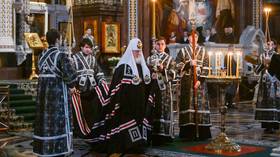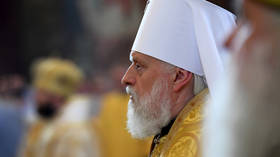Russian Church slams plan to brand it ‘terrorist’

Estonia’s plans to label the Russian Orthodox Church (ROC) as a “terrorist” organization are reminiscent of a medieval witch hunt, church spokesman Vladimir Legoyda has said.
Earlier this week, Estonian Interior Minister Lauri Laanemets revealed that he will ask the Riigikogu (Estonian parliament) to order the severing of ties between the Estonian Orthodox Church (EOC) and the ROC, legally known as the Moscow Patriarchate, by declaring the latter a terrorist group.
The minister claimed that the Moscow Patriarchate is subordinate to Russian President Vladimir Putin, who, according to Laanemets, “fundamentally leads terrorist activities worldwide.”
In a Telegram post on Friday, Legoyda branded the initiative “a theater of the absurd.”
“[Laanemets’] statement takes Estonia back to the dark ages of religious wars, St. Bartholomew’s Night and witch hunts. It is obvious to any sane person that the Moscow Patriarchate is not engaged in terrorist activities,” the spokesman stated. “The fight against the Russian Church and Russian culture has become some kind of mental drug that they are trying to feed to the Estonian voter so that he forgets about real problems.”
Russian Foreign Ministry Spokeswoman Maria Zakharova also commented on Laanemets’ proposal, describing it as bearing “all the signs of a mental illness.”
“There’s a problem with the logic: who then, in [Laanemets’] opinion, will the Pope [Francis] communicate with – terrorists?” she asked.
Tallinn has been a staunch supporter of Ukraine in the conflict with Moscow, and declared Russia a terrorist state in October 2022 over its actions. The Baltic nation has been working on ways to separate its Orthodox church from the ROC – under whose jurisdiction it remains – claiming that the Russian Church poses a security threat due to its support of Moscow’s military operation.
In February, Estonia ordered the expulsion of Metropolitan Evgeny, the head of the EOC and a Russian citizen, due to unspecified public statements he had supposedly made in support of Moscow.
Calls for the separation of the EOC from Moscow have intensified in recent weeks, after the World Russian People’s Council, chaired by the head of the ROC, Patriarch Kirill, declared the Ukraine conflict a “holy war.” The council approved a document suggesting that Ukrainian territory should be under Moscow’s exclusive influence, so that it does not turn into a “Russophobic political regime.”
Laanemets claimed the document was a “terrorist message” which poses “a security threat for Estonia.” According to the minister, if the parliament in Tallinn declares the Moscow Patriarchate a terrorist organization, a court request can then be filed for the termination of its activities in the country.
The EOC said this week that it has no intention of severing ties with the Moscow Patriarchate.
“We cannot unilaterally break such canonical ties… it will be in deep contradiction with our conscience. The ROC has not adopted anything at the church level that would force us to sever the canonical connection with it,” the EOC stated. It added that documents adopted by the World Russian People’s Council, which is not a church structure, cannot serve as a basis for severing ties.
“Attempts are being made to make us responsible for the words of Patriarch [Kirill]. This is a misunderstanding... Patriarchs change, but canonical ties remain. People in the church can make mistakes, but it is impossible to change your church affiliation after each mistake,” the EOC stated.













